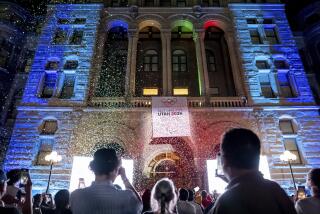Nothing Is Final in USOC Search
The U.S. Olympic Committee, in a move that underscores the fierce political infighting that has yielded a long period of uncertainty in its senior leadership ranks, voted Friday for the second time in two months to launch a national search for a chief executive officer.
Meeting in Denver, the USOC’s executive committee turned aside a bid by a faction of the policy-making board to install interim CEO Scott Blackmun permanently.
Sandra Baldwin, who in December was elected the USOC chair, its top volunteer position, has made it clear she wants Blackmun on the job permanently. The CEO is the USOC’s day-to-day operations chief. And Blackmun wants the job. The 43-year-old lawyer has held the interim tag since last October, when Norm Blake abruptly resigned after just a few months on the job--in part because he was stymied by USOC politics.
The vote Friday affirmed the action the board took last month at a meeting in New York to proceed with a search. Some voted again Friday for a search because they think the USOC is obliged to undertake such a process, others because they are now pushing alternative candidates, said several sources who were in the meeting and spoke on condition of anonymity.
The vote last month in New York for a search was 15-2. The Denver vote on Friday was much closer, turning on one, perhaps two votes, sources said.
“Everyone believes that Scott is doing a great job,” Baldwin said. “The primary issue is the obligation as a quasi-public organization in some people’s minds to make sure that there is not someone out there who might possibly do a better job. It’s about process; it’s not about Scott.”
The unsettled CEO situation has plagued the USOC as it gears up for the Salt Lake Winter Olympics, which begin Feb. 8, 2002, and which will be the last Games in the United States for at least 10 years.
Blackmun said afterward, “At the end of the day, I’m still very interested in the job. I hope the search will turn out successfully for me and therefore don’t have any present intention of moving on.”
Indications Friday were that Don Fehr, the executive director of the major league baseball players’ union who also serves on the USOC’s Executive Committee, would direct the search process.
In other action Friday, the executive committee gave its OK to a four-year draft budget, approved a series of initiatives aimed at toughening anti-doping controls and endorsed Anita DeFrantz’s candidacy for president of the International Olympic Committee.
DeFrantz, an IOC vice president who heads the Amateur Athletic Foundation in Los Angeles, announced earlier this month she is a candidate to replace Juan Antonio Samaranch, president of the IOC since 1980. He retires in July.
Former USOC Chair Bill Hybl, who last year became an IOC member himself, introduced the motion Friday to endorse DeFrantz’s IOC campaign--a move to demonstrate U.S. solidarity, particularly in light of the contentious history of their relationship.
The draft USOC budget, which now moves to the board of directors for approval, makes plain how big a business the USOC has become.
The 2001-2004 budget draft--like many Olympic institutions, the USOC runs on a four-year cycle to take in Winter and Summer Games--calls for overall revenue of $491.5 million and expenses of $488.7 million.
The 1996-2000 budget featured revenues of $409.2 million and expenses of $435.9 million. Despite the discrepancy, the USOC now has at hand a cash surplus of $26 million.
As a measure of the USOC’s growth, the 1981-84 budget, which included preparations for the Sarajevo Winter Olympics and the Los Angeles Summer Games, saw revenues of $97.3 million and expenses of $86.4 million--meaning revenue for 2001-2004 is more than five times what it was 20 years ago.
More to Read
Go beyond the scoreboard
Get the latest on L.A.'s teams in the daily Sports Report newsletter.
You may occasionally receive promotional content from the Los Angeles Times.






